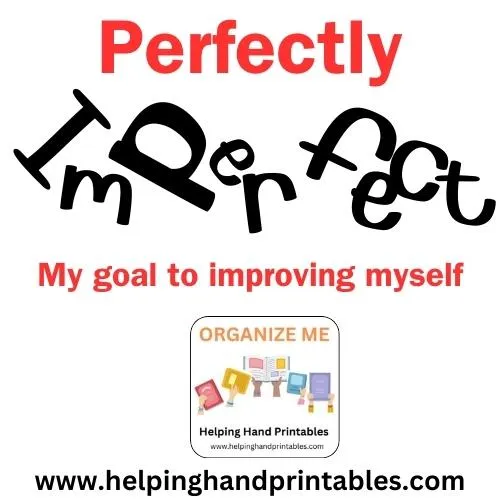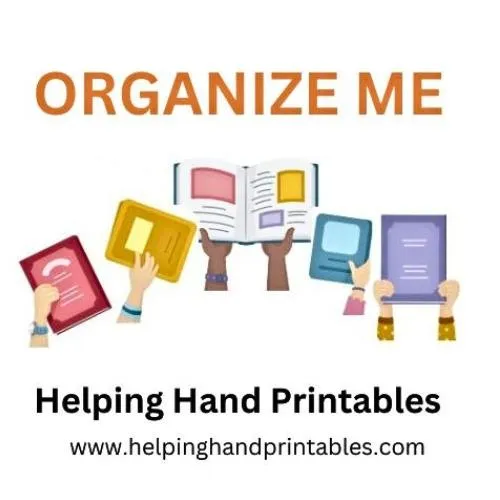How can Imperfections with printables improve your life?

It's Time To Make A Change. . . . . In Yourself
Have you ever noticed how it's so easy to point out flaws in others, to demand that they improve themselves and eliminate their imperfections? Yet, when it comes to our own faults and shortcomings, we often turn a blind eye, conveniently ignoring the work we need to do on ourselves.

But here's the truth: we are no different than those we wish to change. We all have our imperfections, our faults, and our areas for improvement. So, why aren't we actively working on ourselves? Why aren't we striving to become better versions of ourselves?
It's time to face reality: only we can change ourselves. No one else can do it for us. We can't expect others to do the hard work of self-improvement while we sit back and remain stagnant.
So, I challenge you to take a good, hard look in the mirror. Ask yourself why you haven't been working on your own imperfections. Reflect on the impact it's having on your life and the lives of those around you.
But don't worry because I have a solution for you. Our printable guides are designed to help you on your journey of self-improvement. Whether you want to work on your blaming, lying, jealousy or many other imperfections, we have resources that can guide you every step of the way.
At Helping Hand Printables, we go beyond the conventional. Our imperfection printables offer more than just guides – they provide comprehensive insights into the why's, how's, and consequences of each imperfection. Through relatable stories like Jack's journey, we illustrate the real-life impact of imperfect behaviors and offer practical examples for correction. With our printables, you don't just receive a guide – you gain a clear understanding of your goals and the tools to achieve them.
It's time to stop pointing fingers and start taking action. Let's commit to becoming the best versions of ourselves, one step at a time. Together, we can make positive changes and create a brighter future not only for you, but for the world.
Are you ready to take the first step towards self-improvement? Access our Imperfection Guides and start your journey of personal growth today.
What Are Imperfections, Idiosyncrasies, or Faults?

Imperfections, idiosyncrasies, or faults refer to characteristics or traits that deviate from what is considered ideal or perfect. These can manifest in various aspects of life, including personality, behavior, appearance, and performance. Imperfections are inherent to being human and are part of what makes each individual unique. They can range from minor quirks and eccentricities to more significant shortcomings or flaws. Embracing imperfections is often seen as a key aspect of self-acceptance and personal growth, as it allows individuals to recognize and appreciate their own and others' humanity.
Self-awareness: Being aware of our imperfections involves recognizing our strengths and weaknesses, as well as understanding how they impact our thoughts, feelings, and behaviors. This awareness serves as a foundation for self-improvement, as it allows us to identify areas where we can grow and develop.
Relationships:
Our imperfections can often manifest in our interactions with others, affecting the quality of our relationships. By acknowledging and addressing these imperfections, we can cultivate healthier and more fulfilling connections. This may involve being more patient, empathetic, and understanding towards others, as well as communicating openly and honestly about our own flaws.
Self-improvement: Imperfections provide opportunities for growth and self-improvement. By actively working on addressing our flaws and weaknesses, we can enhance our skills, develop new competencies, and achieve our personal and professional goals. This may involve seeking feedback, setting realistic targets for improvement, and persisting through challenges.
Emotional Intelligence: Imperfections are intricately linked to our emotions and how we regulate them. Developing awareness of our imperfections can enhance our emotional intelligence, enabling us to recognize and manage our emotions more effectively. This can lead to greater self-control, empathy, and resilience in navigating various social situations.
Healthy Boundaries: Understanding our imperfections helps us recognize when our behavior may be crossing boundaries or causing harm to ourselves or others. By setting and maintaining healthy boundaries, we can protect our well-being and maintain respectful and supportive relationships. This involves being assertive about our needs and limits while also respecting the boundaries of others.
Resilience: Imperfections are an inherent part of the human experience, and learning to accept and embrace them can build resilience. By recognizing that setbacks and failures are opportunities for learning and growth, we can bounce back stronger from adversity. This resilience enables us to navigate life's challenges with greater confidence and optimism.
Authenticity: Embracing our imperfections fosters authenticity in our relationships and interactions. When we are honest and transparent about our strengths and weaknesses, we allow others to see us as we truly are. This authenticity deepens connections and fosters trust, leading to more genuine and fulfilling relationships.
Life Satisfaction:
Ultimately, addressing our imperfections contributes to greater life satisfaction and fulfillment. By actively working on self-improvement and personal growth, we can live more authentically and meaningfully. Embracing our imperfections as opportunities for growth allows us to lead more purposeful and fulfilling lives, characterized by resilience, authenticity, and meaningful connections.
Personal Responsibility: Acknowledging our imperfections encourages us to take personal responsibility for our thoughts, feelings, and actions. Instead of blaming external factors or others for our shortcomings, we recognize that we have the power to change and improve ourselves. This sense of urgency empowers us to make positive choices and pursue our goals with determination and perseverance.
One important aspect to consider regarding dealing with challenging behaviors like lying, bullying, or instigating, is the importance of promoting empathy, understanding, and effective communication in all interactions. Building strong interpersonal skills and fostering a supportive, inclusive environment can help prevent and address these negative behaviors before they escalate. Additionally, creating a culture that values honest, respect and accountability can contribute to healthier relationships and communities. It's also crucial to provide resources and support for individuals who may be struggling with these behaviors, whether as perpetrators or victims, to help them address underlying issues and foster personal growth.
Conclusion: In conclusion, acknowledging and addressing our imperfections is a transformative journey that can enrich our lives and relationships in countless ways. By cultivating self-awareness, fostering emotional intelligence, and embracing authenticity, we pave the way for personal growth and self-improvement. Through the lens of imperfection, we learn the value of resilience, empathy, and accountability, allowing us to navigate life's challenges with grace and humility. As we strive for continuous improvement and embrace the process of self-discovery, we unlock our full potential and embark on a path towards greater fulfillment and authenticity. Remember, it's not about achieving perfection, but rather about embracing our imperfections as opportunities for growth and transformation.
See Q&A for more information on Imperfections.
Disclaimer: The results achieved through the use of our printable guides are solely dependent on the individual's efforts and commitment. While our resources are carefully designed to support personal growth and development, we cannot guarantee specific outcomes or success. It is important to understand that the effectiveness of our guides is contingent upon the dedication, persistence, and active participation of the user. Success is not guaranteed unless the individual consistently applies the strategies and techniques outlined in the guides. We encourage users to approach their journey of self-improvement with realistic expectations and a willingness to invest time and effort in their personal growth.
